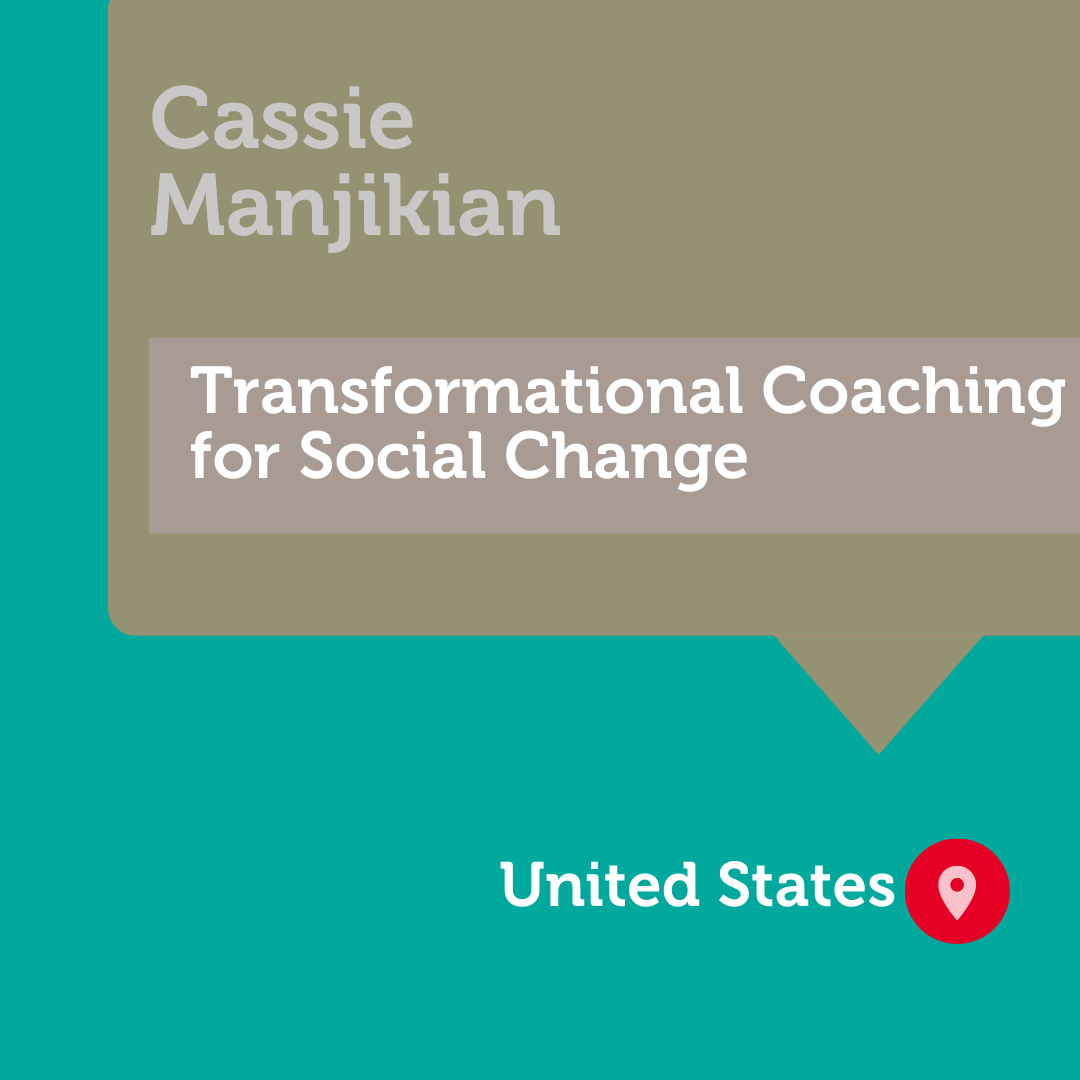A Research Paper By Cassie Manjikian, Transformational Coaching for Social Change Leaders, UNITED STATES
White Anti-Racist Coaching
If you have come here to help me, you are wasting your time. But if you have come because your liberation is bound up with mine, then let us work together.– Aboriginal activists, Queensland, Australia, 1970s
Like many coaching concepts, accountability practices in both theory and practical application are woven throughout coaching conversations. But what does accountability look like for white individuals who practice anti-racist coaching? In this historical moment of racial reckoning, what accountability systems and structures could support the predominantly white coaching sector in moving toward achieving racial justice for all? This paper explores the multi-level meanings of coaching accountability and shares accountability practices, resources, and recommendations for white individuals around anti-racist coaching.
White Supremacy and Anti-Racism Defined
White supremacy is defined as “a historically-based, institutionally-perpetuated system of exploitation and oppression of continents, nations and peoples of color by white peoples and nations of the European continent [and Western nations] for the purpose of maintaining and defending a system of wealth, power and privilege.”[1]Anti-racism is a process of actively identifying and opposing racism, challenging white supremacy, and actively changing the policies, behaviors, and beliefs that perpetuate racist ideas and actions.[2]
Why Address Accountability for White Anti-Racist Coaching?
During this historical moment of racial reckoning, the anti-racist work of dismantling white supremacy is the work of our time. After the 2020 murder of George Floyd and countless other atrocities and injustices internationally, we saw many sectors – including the International Coaching Federation (ICF) – make statements denouncing anti-Black systemic racism and committing to diversity, equity, and inclusion principles. However, white supremacist violence continues to harm and kill Black bodies and the bodies of people of color, and pervasive systemic racism and oppression continue.
The work of undoing white supremacist conditioning must be done by white people who recognize that our liberation is inextricably connected and that we must all work together toward our mutual freedom and redistribution of power. As Robin DiAngelo, author of White Fragility: Why It’s So Hard for White People to Talk About Racism, has said:
“For too long, [white people] have turned to people of color as if we are outside of race and they’re the holders of racial knowledge. And even then, if we don’t agree with what they tell us, in our arrogance, we dismiss it. Always looking to people of color is to put an incredible burden on them. And that’s another reason why I think people are starting to realize that we’ve got to start looking at ourselves.”[3]
Coaching is a powerful tool to look at ourselves, and in this moment of increasing global awareness around racism, accountability is imperative to collectively move us toward action and commitment. While this work is challenging and complex, we know as coaches that the combination of a growth mindset and create accountability systems and structures could support all of us in achieving racial justice and liberation for all. As Black leaders remind us: “When Black people are free, all people will be free.”
As a white-identifying coach-in-training, I offer this paper as a resource addressed primarily to other white-identifying coaches within the International Coach Academy (ICA) and beyond, who are responsible for doing the work of dismantling white supremacy. It’s not perfect, and that’s also the point – since perfectionism and assuming that there’s a “right” way to do things is a harmful characteristic of white supremacy that limits all of us. I hope that this paper demonstrates anti-racist practice in action and that it also supports Black Indigenous People of Color (BIPOC) coaches and individuals in furthering our collective goals for racial justice, equity, and liberation.
Coaching Accountability Defined
Merriam-Webster defines accountability as “a willingness to accept responsibility or accountability for one’s actions.”[4] On an individual level, accountability usually arrives near the end of coaching conversations. After the coachee has come to some action steps, the coach asks what kind of accountability they may need.[5] This may include the coach serving as an accountability partner, or helping the coachee to identify and build structures to support self-accountability.
On a relational level, accountability practices help both the coach and coachee move forward in a responsible, aligned way toward the goals they set. For the coachee, this may include showing up to sessions in an open, honest, engaged way that owns and honors their self-determined work in the coaching experience toward their personal goals. For the coach, accountability may include upholding ethical and professional coaching standards, periodically checking in about how the coach experience is progressing for both partners and being clear about what each partner is responsible for and not responsible for. Supporting the coachee as a whole, a unique, resourceful person within a trusting, safe coaching space is key to allowing them to build their own accountability toward their desired goals.
Coaching Accountability Within a Context of Racial Injustice
Taking a step further to a macro-systemic level, what does coaching accountability look like during this current historical moment of racial reckoning? Research shows that the whole coaching sector, like many other industries, must evolve in order for us to collectively achieve racial justice and equity.[6] Mainstream coaching spaces, training programs, and the International Coaching Federation (ICF) accrediting body offer classes on diversity, equity, and inclusion, but lack a critical analysis of the impacts of systemic oppression and racism within the coaching sector. This “colorblind” approach adversely impacts coaching methodologies, frameworks, strategies, BIPOC individuals, coaches, and social movements. In other words, as long as mainstream coaching sectors and leaders aren’t proactively anti-racist, they are perpetuating white supremacy culture.
Within this context of systemic racial injustice, coaching accountability requires not only top-down sectoral awareness and shifts by coaching institutions, governing bodies, programs, and leaders. It also requires bottom-up awareness, recognition, and commitment by individual coaches to be proactively anti-racist. This can take place in multiple ways while coaches engage in coaching conversations, relationships, and networks.
Accountability Within White Anti-Racist Practices
The People’s Institute for Survival and Beyond, an anti-racist training organization based in New Orleans, defines accountability as:
a position by which one will be held in check or account for one’s decisions and actions… the acceptance of a role within a cultural, political, and social perspective that leads to the liberation of peoples of color from racism, oppression, and cultural subordination. It requires a commitment to the vision of African-Americans and other oppressed peoples to assume self-determination over those areas deemed by them to directly affect their lives.[7]
Accountability for white anti-racist practitioners is the awareness and acceptance of their role in and relationship to white supremacy, and commitment to proactively practicing anti-racism. This means continually asking how effective their actions are toward anti-racism, for example by:
- Directly asking BIPOC individuals with who there are trusting relationships who have agreed to offer feedback;
- Talking with other white people who have an anti-racist framework; and
- Reading the work of BIPOC authors about their wants and needs.[8]
Accountability Within Anti-Racist Coaching Practices
One example of how white supremacy pervades coaching is in power dynamics with coachees. Even though coaches see coachees as self-determined experts in their own lives, the reality of how coaching gets practiced is that the coaching role is inherently more powerful. Coaches ask questions, aren’t as vulnerable, and can consciously or unconsciously direct coaching conversations. Anti-racist coaching requires the coach to dismantle power dynamics whereby the coachee sees the coach as an expert. To do this, the coach must cultivate deep self-awareness, self-management, and presence to avoid conscious or unconscious bias, judgment, and assumptions, and move toward creating a balanced relationship that authentically sees and serves the coachee.
A beautiful framework that illustrates anti-racist coaching practices is the concept of liberatory coaching, defined by BIPOC coaching leaders Sarah Jawaid and Damon Azali-Rojas:
listening, seeing, feeling, and sensing in multiple dimensions to someone’s essence and what they are being called to evolve into. It has the Liberatory Coach self-reflect and does their own work around transmuting their individual and generational trauma, nurturing clear boundaries, and being able to show up with a deep and authentic presence. It centers healing as a continual and evolving process, sees transformative and compassionate justice as integral to a world that we want to create, and celebrates the little moments of liberation on the path to big liberation. Liberatory Coaching invites one into connection with all of our relations, cousins, siblings, and neighbors. It invites us into relation with self.[9]
As Sarah Jawaid and Damon Azali-Rojas described in their book, “Love Letter to the Movement: Using a Coach Approach for Healing, Justice and Liberation,” the three principles of liberatory coaching include:
- Holding a self-energized coaching container;
- Inviting awareness of systems and cultures of oppression; and
- Practicing unconditional love.
Through this modality or framework, anti-racist coaches can hold themselves and others accountable for dismantling white supremacy in their coaching conversations, relationships, and networks.
Accountability Practices for White Anti-Racist Coaching
Having explored the multi-level meanings of coaching accountability, what accountability practices can white coaches actually use to dismantle white supremacy?
For white coaches committed to anti-racist practices, accountability means using their privilege to make things right for those whose historical and current-day oppression led to their privilege. It means joining or supporting anti-racist and BIPOC-led groups within the coaching sector and beyond, to support the BIPOC community in ways that aren’t extractive. Most of all, it means a commitment to the ongoing study and practice of anti-racist coaching.
There are many ways that white coaches can advance racial equity and justice in ways that aren’t extractive of BIPOC individuals, some of which are described in categories below:
Self-Accountability
- Seek an understanding of the realities of systemic racism and its impact on individuals and organizations
- Incorporate awareness and analysis of historical and present-day systems of oppression into coaching practices
- Commit to continued self-reflection, self-awareness, self-development, self-care, and self-management in the pursuit of anti-racist coaching
- Donate a portion of coaching income to anti-racist BIPOC-led organizations, as a form of reparations
Relational Accountability
- Commit among other anti-racist coaches to take a stand against racism in both personal and public lives
- Work to respectfully challenge racism and promote anti-racist culture and networks
- Commit to ongoing participation and practice in anti-racist organizations and groups
Sectoral Accountability
- Seek an understanding of systemic racism, inequities, and injustice within the coaching sector
- Incorporate awareness and analysis of historical and present-day systems of oppression into coaching curricula and training programs
- Explore alternative coaching approaches outside of white supremacy culture, and how to include them in coaching curricula, frameworks, and modalities
- Recruit and promote the leadership of BIPOC individuals within the coaching sector, such as within networks, training programs, and accrediting bodies
- Support BIPOC-led coaching programs through donations, connections to funding, and recruitment of BIPOC coaching applicants
Accountability Resources for Anti-Racist Coaches
Increasingly, there are many resources available for coaches to hold themselves, their relationships, and the coaching sector accountable for advancing racial equity and justice. Below are several helpful resources.
Self-Accountability
Relational Accountability
Sectoral Accountability
These resources as building blocks mean nothing without the proper partnerships. To combat systemic racism, we must empower and engage BIPOC individuals in mainstream coaching, and be mindful to collaborate in ways that aren’t extractive.
Recommendations
Understanding and working for racial justice is complex. It can feel overwhelming for white individuals to hold themselves accountable for achieving racial justice and equity, especially within coaching relationships that involve power dynamics, or the larger coaching sector. The good news is that with a growth mindset, there is much that white-identifying coaches can do to practice anti-racism:
- Educate yourself through reading and studying to understand the complexities of systemic racism.
- Deepen your understanding of the complex nature of racial identity, socialization, and systemic oppression.
- Deepen your understanding of your racial identity through reflection, journaling, and genealogy, to build emotional resilience and counter white fragility.
- Develop a deeper capacity for advancing racial justice, diversity, equity, inclusion, and belonging.
- Support others to develop anti-oppressive spaces at work, at home, and in your community.
- Develop your personal stake and commitment to working to end racism in your lifetime.
White-Identifying Anti-Racist Coach
A skilled white-identifying anti-racist coach can support clients by creating and holding a safe, trusting, grounded, spacious coaching container that’s rooted in deep presence and awareness of systemic oppression.
Questions to ask that illustrate these concepts could include:
- What wisdom would your ancestors tell you about this?
- What is the beautiful unmet need that this story signifies for you?
- Given what you know, how does white supremacy influence your feelings?
- What does power feel like in your body?
- What do you want your legacy to be?
Through these types of questions, clients may feel more fully seen and heard, and able to identify and shift toward a desired, liberatory way of being.
References
[1] The definition is from the Challenging White Supremacy Workshop.
[2] “What is anti-racism?,” Kendra Cherry, Very Well Mind, 2021.
[3] “Robin DiAngelo: How ‘white fragility’ supports racism and how whites can stop it,” CNN Health, 2020.
[4] “Accountability,” Merriam-Webster, 2023.
[5] “8.7: Coach partners with the client to design the best methods of accountability for themself”, ICF PCC Markers, 2022.
[6] “Becoming Anti-Racist: How Coaching Needs to Evolve to Achieve Racial Equity,” CoachHub, 2022.
[7] The definition is from the Challenging White Supremacy Workshop.
[8] Anti-racism and White Accountability.
[9] Jawaid, S. & Azali-Rojas, D. 2022. Love Letter to the Movement: Using a Coach Approach for Healing, Justice and Liberation.

/iStock-1395144844_blog.jpg#keepProtocol)


